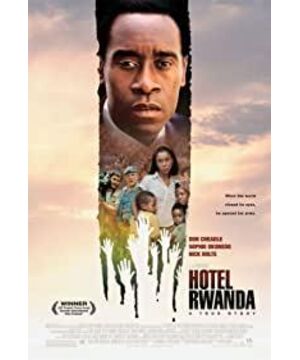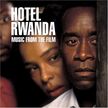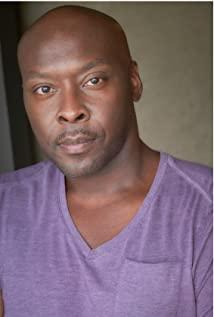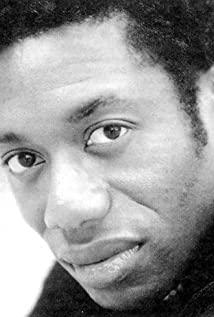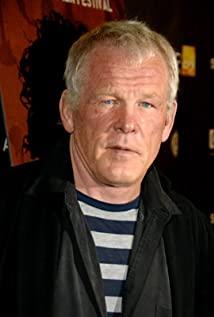This is a film adapted from real events. The film is similar to "Schindler's List" + "Peace Hotel". The story is based on the genocide in Rwanda in 1994.
Rwanda is mainly composed of Hutu and Tutsi people. Hutu and Tutsi each account for 85% and 14% of the population of Rwanda. From the 16th century to the 19th century, when Europeans divided up Africa and ruled Rwanda, they used the difference of ethnic identity to support the Tutsi people to control the state power and rule the Hutu people. The two sides accumulated many contradictions. In 1959, the Hutu peasants in southern Rwanda began to rebel against the rule of the Tutsi aristocracy and took power, redistributing land to the landless, many Tutsi aristocrats fled to neighboring countries. After Rwanda declared its independence in 1962, the Tutsi and Hutu clashes occurred many times, and the fighting continued. In 1990, the Rwandan Patriotic Front (RPF), a Tutsi refugee organization living in Uganda, broke out in a civil war with the Hutu government forces. Under the mediation and pressure of neighboring countries, in August 1993, the Rwandan government and the Patriotic Front signed an agreement in Tanzania. Peace agreement to end the civil war. However, the peace agreement threatened the interests of the Hutu in the senior government of Rwanda. They gradually became dissatisfied with the president, believing that he had made too many concessions in the negotiations with the Tutsi. On April 6, 1994, the plane carrying the President of Rwanda was shot down near the capital of Rwanda, and two Hutu presidents were killed.
The incident was taken advantage of by the extreme Hutu people at the top of the government, who incited hatred through the media and radio, and triggered bloody retaliation and massacres against the Tutsi nationwide in Rwanda. Between April and July 1994, nearly one million people were killed. 94% of the victims were Tutsi, which is equivalent to one-eighth of the total population. There were also 250,000 to 500,000 Rwandan women and women. The girl was raped. Among the targets of the massacre were moderate Hutu people who sympathized with the Tutsi and advocated reconciliation.
The protagonist in the film, Paul, is a Hutu tribe who works as a manager in a foreign hotel in the capital. During the Rwanda massacre, when all peacekeeping troops were completely withdrawn and security was lost, the bloody wind and blood flowed outside the hotel. All Tutsi people became lambs to be slaughtered. He risked his life to deal with the rioters. Among them, sheltered the Tutsi people who came to the hotel to take refuge. Although the helpless people are almost desperate, the protection of the Rwanda Hotel has rekindled their hope of survival. In the end, Paul successfully saved the lives of 1,268 Tutsi people.
After watching the film, a lot of people rushed to praise the protagonist Paul for the beauty of human nature in the midst of crisis. I admit it. But perhaps as a pessimist, I feel more sad about human nature.
1. There should be a universal value in the world that can transcend the boundaries of countries, races, and time, is recognized by the world, and can exist as truth. That is the most basic conscience of mankind, respect for every individual life.
2. After the Rwanda massacre, although the whole world has reflected on it, this kind of ethnic cleansing has not stopped. Similar ethnic killings continue to occur in conflicts in other African countries such as Sudan and Congo.
3. Many film critics discussed the film as a political element, and believed that the history of whites and Western colonization led to the roots of the conflict in Rwanda. The film’s perspective was mainly sympathetic to the Tutsi people. I am very opposed to the practice of politicized commentary. Once people use history and politics to find reasons for defense, they can find excuses for all crimes. Because if this logic holds true, then al Qaeda’s terrorist attacks are justified, revenge against ordinary civilians is correct, and all massacres and hatred can be excused.
4. Whether human rights are higher than sovereignty or sovereignty is higher than human rights, I believe anyone with a conscience and reason can get the answer. There is still a huge gap between our country and a normal country with universal values.
5. Inciting hatred is very simple, especially when under the banner of nation, country, and class. After the collective unconscious of mankind is incited, it can explode the coldest and most indifferent aspect of human nature. Many sins and evil deeds in history have been concealed under the guise of the country and the nation. The nation we belong to is only more than 40 years away from the era of collective madness and crime. Moreover, we never really reflect, that ghost has always been floating above everyone's head, always in danger of coming back.
6. Our country and people are the group that is most prone to be incited, and the masses who are most prone to collective madness. Taking to the streets, boycotting goods from a certain country, smashing a certain country’s supermarkets, clamoring for war with Southeast Asian countries... these are all happening around us. When such collective emotions are used and hypnotized, why do we think that the same is the same for foreign countries and ordinary people of foreign races? The violence will not happen to us?
7. What Hegel said: The biggest lesson history teaches is that there is no lesson.
8. Borrowing a sentence from the movie "The King of War" revisited before, and also a sentence from the last film review: "Everyone on earth will die in war."
View more about Hotel Rwanda reviews


